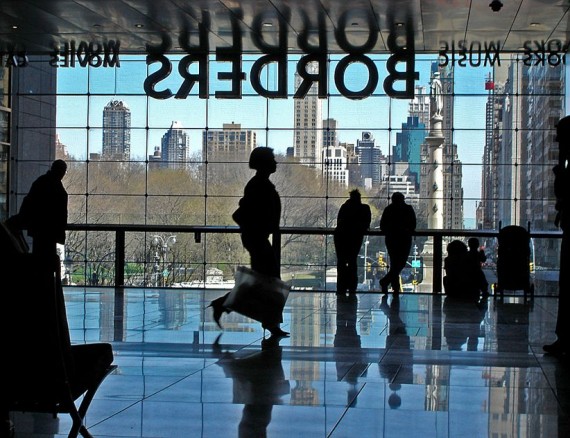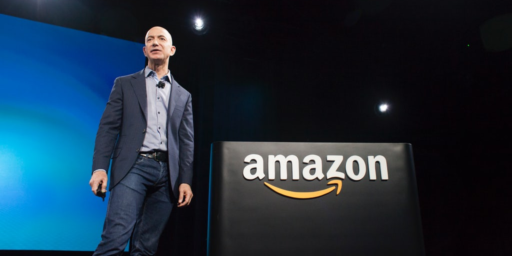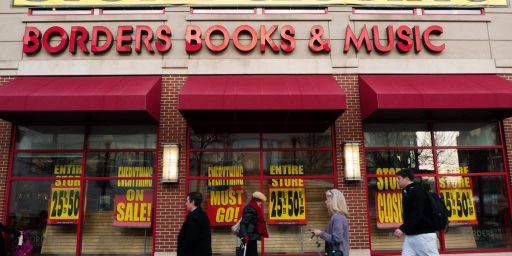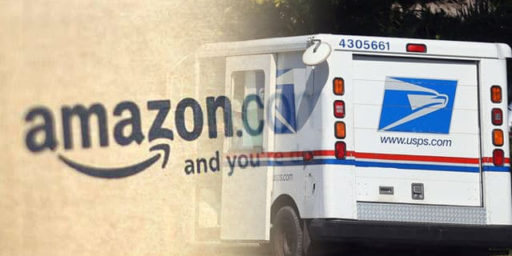Borders Books, RIP
They’re not technically out of business yet, but it’s a matter of time. Borders has quit paying for the books got on consignment — publishers like to call this “theft” — and otherwise has no strategy for becoming relevant again. Michael Rosenwald for WaPo:
How Borders arrived at this once-unthinkable moment is, like many stories of troubled companies, a tale of strategic errors, missed opportunities and revolving-door management (the chain is now in the hands of a former tobacco executive). But the company’s collapse, though perhaps hastened by missteps, seems to many industry insiders to have been inevitable, brought on by cultural changes too swift and sweeping to fend off, even for a huge player in the nation’s cultural life.
Borders was a major force in redefining Americans’ reading habits, selling millions of books in places where they had once been scarce and helping scores of novels to become movies and subjects of national conversation. Now, Borders faces a pool of potential customers who quickly spread culture themselves, one viral video or status update at a time.
Once, Borders was, with rival Barnes & Noble, the long tail of reading, with supermarket-size stores offering thousands of obscure titles alongside bestsellers. Now, Borders confronts the limitless, more efficient supply chain of Amazon’s online emporium. Borders, which helped a generation of readers learn the pleasure of diving into a book for hours at a stretch, now competes for the attention of readers who dip into a few pages on an iPad, open Facebook, read some more, then tweet random thoughts. Printed books don’t need a power outlet or a data plan, yet for some people, their utility seems to be fading.
Despite the mythology that the mass retailers killed off a massive number of mom and pops, the fact of the matter was that, outside huge cities and college towns, there really weren’t bookstores in most of America until Borders.
Before Riggio and the Borders brothers, Louis and Tom, started their chains in the late 1960s and early 1970s, respectively, bookselling in much of the United States was largely confined to quaint independent shops offering personally selected, mostly highbrow books. Chains such as B. Dalton and Waldenbooks, offering mostly bestsellers, emerged in the shopping malls that opened as middle-class families moved to the suburbs.
[…]
“They elevated book-buying to the same status as any core retail experience,” said John B. Thompson, a University of Cambridge professor and author of “Merchants of Culture,” a history of the publishing industry. “They were reaching parts of America that had simply never been reached before with books – not just New York and Los Angeles, but small towns, other urban centers, a whole untapped market of people who wanted to buy lots of books.”
Alas, the business they built through innovation and technology was beaten out the same way:
It started with Amazon. Launched in 1995 by Jeffrey Bezos, the company aimed to be the biggest bookstore on the planet, and it shipped books anywhere at prices so cheap that it lost money on many sales. The jokes came fast: Amazon dot bomb, some people called it. Amazon dot gone, others said.
But it turned out that Amazon knew what it was doing, building an infrastructure that eventually displaced Borders – then known as the more bookish of the chains – as the preferred way to get the right book into the hands of the right customer. Amazon built software that suggested other books to customers, based on their orders. As Amazon got better at such tactics, “Borders lost that patina they had, that special place of a bookstore, and they became just another discount retailer,” said Albert Greco, senior researcher at the Institute for Publishing Research.
Increasingly, they’re a retailer selling a product with few customers. While an “e-book” is just as hard to write, it’s a very different product. And, presumably, not one that will be experienced communally.







The contrast between Barnes and Noble and Borders is instructive. Barnes and Noble embraced the internet and e-books, and came up with unique ways to enhance revenue, such as the Nook, which is a capable contender to the Kindle, and other things like their absolutely GORGEOUS printings of public domain books.
Despite the mythology that the mass retailers killed off a massive number of mom and pops, the fact of the matter was that, outside huge cities and college towns, there really weren’t bookstores in most of America until Borders.
Is that really true? I figured that most places would be like the small town where I live now. Even here there’s a bookstore. The problem is that if you are looking for any particular title, you’re probably out of luck. In a nearby small town, there’s also a bookstore, but it’s a used book store. So while I think you have a point, I think you take it a bit further than I would be willing to go.
At the very least, it seems likely that in the absence of B&N and Borders, these places would not be exactly rare. It can definitely be said, though, that B&N really provides something that Mom and Pops never did. Something valuable to consumers. On the other hand, something they can now get from Amazon.
I lament the passing of Borders. They were allied with Seattle’s Best Coffee, which is preferable to Starbucks (which B&N is allied with) and, unlike the latter, more difficult to find except in the bookstore. Maybe SBC will hook up with Hastings.
While an “e-book” is just as hard to write, it’s a very different product. And, presumably, not one that will be experienced communally.
On the contrary, the enhanced e-book will be a far more communal experience. The book of the future will come attached to or packaged with (still working out the terminology) games and social networking and sponsorships leading to still other opportunities for games and social networks.
Even the boring PhD policy books you read, James, will be built with interactive maps, charts, diagrams, bits of music and video, author commentary, continuously updatable footnotes, and easy connections to other people reading the same book and commenting, discussing, etc…
It’s going to be fun.
That said, of course I’m sorry to see Borders go. (They aren’t quite dead yet, by the way. But close.) But you can’t wish the future away. They won’t be the last victims. Ten years from now a lot of publishing will be gone as the e-book advances and as the means to connect authors directly to readers without intermediaries develops.
gun = fun.
Er . . . anyway. Oy.
Thank you James for shining some light on this piece. While it is part of capitalism to have creative destruction of businesses that are no longer viewed by the market as having a net positive good, there is something undeniably tragic about the downfall of an iconic institution. It reminds me of times during my undergraduate education when small mom-and-pop shops around Berkeley were being replaced by large chains. We can celebrate progress and mourn those being tread under at the same time.
@Michael:
The interactivity idea makes sense although I wonder whether they’ll even meaningfully be “books” at that point. They’d essentially be very targeted websites!
I agree with Trumwill. The small town where I grew up, decidely not big or a college town, has had a bookstore for a long time. But it is just a fairly small shop. When I first saw a Borders about 20 years ago in Rochester, I was stunned. It seemed like they must have had every book ever made in stock. Much bigger and better than the Waldenbooks places.
These days, it seems like if there’s a Borders, there’s a B&N not far away, so Borders closing may not do much other than enrich B&N. For some reason, I’ve always been partial to Borders; it seems like the Costco to B&N’s Sam’s Club. Whatever that might mean.
James:
The way we are going at it in the project whose name I’m not supposed to utter is to create an app that lives in the universe of the story but is distinct from the book. A prequel/game.
Then go to some guerilla marketing.
Then launch the book book, followed by an e-book-only “tweener” a sort of one-off sequel. Rinse and repeat. The enhanced e-book we’re looking to as a sponsorship opportunity, so we’ll see about that in 10 days when we talk to Hollywood agencies.
But yeah, all parts of it will connect back through a web site rife with social media etc…
Of course this is all in the category of fiction. But when I go on my occasional rants about the education system being functionally, um, behind the times to use the polite phrase, it’s because I’m looking ahead and seeing these same tools used for teaching history or algebra. Rather than a fixed, dull and outdated textbook, you’d have this kind of media, and rather than a teacher who may or may not be well-versed in the subject you’d have social media which would include experts in the field.
Michael:
Yes, the potential for that sort of thing is phenomenal. On the other hand, it would seem to cut out the favorite ploy of academic textbook publishers: successive editions, each only slightly tweaking the last. Or, actually, it would keep that alive but as an ongoing obligation to old customers rather than as a means of selling “new” books.
I grew up in a small town with many book stores and no college …
As I’ve said, my birthday is coming up. I’ve been making Kindle mewling noises around the house….
On great thing about Kindle, and probably the other ones, I don’t really know, is that I can get out of print books for usually not a lot of money. For instance, I’m a big fan of the late John Gardner. At one time, I had all his books, but with moving around over the years — well, you know. So I decided to rebuild my collection. Unfortunately I found that The Wreckage of Agathon is out of print. I was able to find someone who’s evidently been hoarding copies of Gardner’s books since the 70s and I was able to buy a copy. It was so old that the perfect binding had dried out. The pages came out in clumps :(. However, when I was scouting the Kindle, I found that the book has been kindlized (?), and I could get it for less than I paid for the hard copy. The mewling grew louder.
@Michael
“Ten years from now a lot of publishing will be gone as the e-book advances and as the means to connect authors directly to readers without intermediaries develops.”
Same with movies. I can envision a near future when you’ll able to stream a movie right from the studio’s servers to your 80″ HD-3D TV, and movie theaters will be a thing of the past. That does sadden me a bit. I grew up with movies as the most democratic (small d) of the media. There was something about the communal experience of sitting a theater watching a movie. That’ll pass. (I sure as hell won’t miss the $5 box of popcorn, though.)
You do realize that since 2003, SBC has been a subsidiary of Starbucks? It’s the exact same coffee with different labels on it.
When I was growing up in a very small rural town (population<2,000), we didn't have any sort of book store. I vaguely remember this building I could go to that had just about any book I could want–and if they didn't have it, they would find it for you!–and they would just let you take that book for free, read it for a few weeks, and give it back. And if you forgot to give it back, you got a friendly call, and an ask for a few dimes.
And if you went there often enough, the staff learned what you liked and had suggestions for you. Sometimes they would even hide books from other customers to make sure you got it first when you came in.
I can't remember what that place was called. I remember it had a portrait of some old fool with a white beard who had something to do with coal or steel or some other such nonsense.
It was like Amazon in a building, only more expensive.
Eh, its probably just my memory playing tricks.
@Sam. $5? So you’re getting the small size.
@Neil: Libraries are next, I’m afraid. As e-book prices drop to $3 or so people will have less and less incentive to wait three weeks to get a beat-up copy of a $20 hardcover from the library.
Libraries will lose their middle-class clienteles and become a lower class thing, which will eventually destroy their ability to get tax money.
<i.You do realize that since 2003, SBC has been a subsidiary of Starbucks? It’s the exact same coffee with different labels on it.
Yes and no. Yes, SBC is owned by Starbucks. No, it’s not the exact same coffee.
In other news, even though Applebee’s is owned by IHOP, it’s not the same food.
Yes it is. Starbucks didn’t even keep SBC’s roasting plant, selling it to The Vashon Island Coffee Roasterie. Both lines come out of the exact same factory in Kent, Washington.
Perhaps I used the word “coffee” when I should have used the word “drink.” I’ll take your word for it that the grounds (as well as the individual ingredients) come from the same place, but the products that they ultimately deliver are different. They have differing menu offerings and even the same drink (“White Chocolate Mocha”, for instance) tastes different (SBC’s is a little lighter). And I haven’t found a drink at Starbucks as good as the Caramel Mocha at SBC, even if I ask for a Caramel Mocha. (On the other hand, the Caramel Machiatto at Starbucks isn’t bad).
They’re still fading, though. If I remember right, B & N is looking for a buyer. They’re not as bad as Borders (which will probably go through bankruptcy and end up dissolved in the next year or two), but they’re getting there.
The thing keeping B&N around longer than borders is the hold they have on the college textbook market.